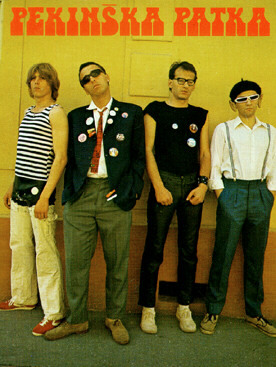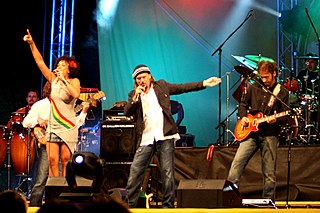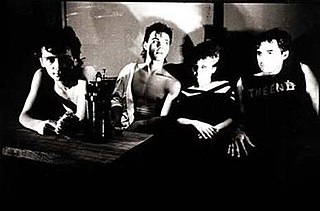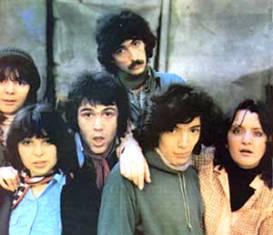History
Punk rock years (1976-1980)
Following the expansion of punk rock in Europe, teenagers Valter Kocijančić (guitar, vocals), Zdravko Čabrijan (bass) and Dušan Ladavac "Pjer" (drums) formed Paraf in 1976. They played their first gig at Belvedere in Rijeka on December 31, 1976. The band's early live appearances were at Rijeka high-school parties along with the bands of similar musical orientation, Termiti, Protest and Lom. During the late 1978, the band started performing frequently, even outside Rijeka. They played in Ljubljana, Belgrade, Zagreb. The band also performed at the Novi Sad BOOM festival, as well as an opening act for The Ruts concert in Zagreb. In 1979, they released their debut single "Rijeka", a cover version of the Ramones song "Chinese Rocks", but Kocijančić signed as the song author in order to test the Yugoslav critics of the time. Despite the intention, it was the Džuboks magazine journalist Petar Luković who recognized that the song was a cover version. The band also appeared on the various artists compilation album Novi punk val 78-80 , released by ZKP RTLJ in 1980, with the song "Narodna pjesma" ("Folk Song").
After several delays, the band debut album A dan je tako lijepo počeo... (And The Day Started Out So Nicely...) was released by ZKP RTLJ in the Spring of 1980. Due to provocative lyrics, the album was classified as kitsch product, and thus liable to additional taxation, despite subsequent changes to some of the lyrics as well as the selection of a different album cover. In line with the punk rock ideology, the band addressed several topics which were at the time new to the Yugoslav rock: the songs featured ironic usages of communist slogans, mocked, at the time, one of the most popular bands, Bijelo Dugme, in the song "Pritanga i vaza", insulting the police in the censored version of "Narodna pjesma", and dealt with social themes typical for a port city. The album was produced by the band's close associate Goran Lisica "Fox", assisted by Igor Vidmar.
After the album release Valter Kocijančić left the band, later joining the band Istočni Izlaz, until quitting his musical career and becoming a teacher, which is also his current occupation. He was replaced by a female vocalist Pavica Mijatović, under the pseudonym Vim Cola, and the former Zadnji guitarist Klaudio Žic. The latter soon left, while two new members - guitarist Mladen Vičić "Riči" and keyboard player Raul Varlen - joined the band. With the arrival of the new members, the band also changed their musical style, moving towards post-punk, influenced by British bands such as Gang of Four and Wire.
Post-punk years (1980-1986)
The new musical orientation was presented to the wider audience on the second synth-laden studio album "Izleti" ("Excursions"), featuring songs "Pobuna bubuljica" ("Acne Uprising"), "Nestašni đački izleti" ("Naughty School Excursions"), "Javna kupatila" ("Public Bathrooms") and "Federico u bačvi" ("Federico in a Barrel"), the latter being inspired by the Federico Fellini film Casanova . The album also featured their classic cold-wave single "Tužne uši" ("Sad ears") with the memorable chant "Ležim na leđima, plačem za tobom, a suze mi teku u uši" ("I am lying on my back crying for you and tears are flowing into my ears").
Guitarist Vičić left the band after a series of promotional concerts and was replaced by a former Termiti (Termites) member Robert Tičić. The new lineup started working on the third studio album. However, before the album was mixed, the twenty-two-year-old Tičić suffered a fatal brain hemorrhage. His replacement was former Konjak guitarist Mladen Ilić, later the founder of the band Psi (Dogs).
Their third album Zastave (Flags), released in 1984, was produced by the band themselves with Borghesia member Aldo Ivančić. Inspired by Miroslav Krleža's multi-volume novel of the same name, the album featured lyrical themes related to the recent European political history. Most of the album featured somewhat obscure thematic references and occasionally absurd lyrics set to sparse, post-punk-influenced melodies such as the Gang of Four-like "Kad se oglasi" ("When the [Trumpet] Sounds") or Wire-influenced "Zastave". In other songs, such as the ethereal "Oj ponose moj" ("Oh, my Pride") and the bizarre collage "Zlatno Doba" ("Golden Age"), Paraf explored interesting and fresh approaches to both songwriting and production. Perhaps unsurprisingly, the album was largely ignored by the mainstream audiences.
Paraf eventually disbanded in 1986. Pavica Mijatović and Zdravko Čabrijan got married, moved to island Krk and started a tourist business. Drummer Dušan Ladavac joined Let 2 but left the band before it evolved into long-lived and influential alternative rock-act Let 3.
Reunions
The original Paraf lineup reunited in 1994 in order to perform at the Ri-Rock festival, the third Fiju Briju festival, as well as to perform several solo concerts. In 1996, Kocijančić performed the song "Rijeka" with the ad hoc group Blagdan Band, and the recording of the song appeared on the live album Pallach's not dead. The original lineup reunited again on December 13, 2003, and the recordings of the songs "Rijeka" and "Hit tema" ("Hit theme") from the performance were released on the various artists live album 25. Ri-Rock, released by Dallas Records in 2004. Four years later, in 2008, the band reunited in both the punk rock and post-punk lineups at the promotion of the Riječki Novi Val box set.

Zabranjeno Pušenje is a Bosnian rock band formed in Sarajevo in 1980. The group's musical style primarily consists of a distinctive garage rock sound with folk influences, often featuring innovative production and complex storytelling. Currently, the band consists of founding member, vocalist and guitarist Sejo Sexon, longtime drummer Branko Trajkov, guitarist Toni Lović, bassist Dejan Orešković, and violinist and keyboardist Robert Boldižar.

Atheist Rap is a Serbian punk rock band from Novi Sad, formed in 1989, which has released six studio albums, one compilation album and one live DVD. Their music is often characterized as "fun punk" due to its cheerful music and vocals. Their lyrics are usually critical of society and politics and are often humorous accounts of everyday events.
New wave in Yugoslavia was the new wave music scene of the Socialist Federal Republic of Yugoslavia. As its counterparts, the British and the American new wave, from which the main influences came, the Yugoslav scene was also closely related to punk rock, ska, reggae, 2 tone, power pop and mod revival. Some of its acts are also counted as belonging to the Yugoslav punk scene which already existed prior to new wave. Such artists were labeled as both punk rock and new wave.

Pankrti are a punk rock band from Ljubljana, Slovenia, active in the late 1970s and 1980s. They were known for provocative and political songs. They billed themselves as The First Punk Band Behind The Iron Curtain. They are one of the most important former Yugoslav punk groups and one of the first punk rock bands ever formed in a communist country.
Termiti were a new wave band from Rijeka, Croatia, then Socialist Federal Republic of Yugoslavia. Their music, sung in mother tongue, had the quirk of an organ sounding keyboard and complex and unusual leading melodies, backed to the usual new wave rock ensemble of images. They are included on the Novi Punk Val compilation album. Some members of the group went on to found Let 3.

Atomsko Sklonište is a Croatian and Yugoslav hard rock band, formed in Pula in 1977. Known for their strong anti-war lyrics, Atomsko Sklonište were one of the most prominent acts of the Yugoslav rock scene.
Punk rock in Yugoslavia was the punk subculture of the former Socialist Federal Republic of Yugoslavia. The most developed scenes across the federation existed in the Socialist Republic of Slovenia, the Adriatic coast of the Socialist Republic of Croatia, the Socialist Autonomous Province of Vojvodina and Belgrade, the capital of both Yugoslavia and the Socialist Republic of Serbia. Some notable acts included: Pankrti, Paraf, Pekinška patka, KUD Idijoti, Niet, Patareni and KBO!.

Novi Punk Val is a compilation album of punk rock and new wave music from the SFR Yugoslavia. It covers the period from 1978 till 1980. It was released by ZKP RTLJ in 1981. It includes songs by notable Slovenian and Croatian artists from the former Yugoslav punk rock and new wave scenes including: Pankrti, Paraf, Prljavo kazalište, Termiti and others.
Popular music in Yugoslavia includes the pop and rock music of the former SFR Yugoslavia, including all their genres and subgenres. The scene included the constituent republics: SR Slovenia, SR Croatia, SR Bosnia and Herzegovina, SR Montenegro, SR Macedonia and SR Serbia and its subunits: SAP Vojvodina and SAP Kosovo. The pop and rock scene was a part of the general Music of Yugoslavia, which also included folk, classical music, jazz etc. Within Yugoslavia and internationally, the phrases ex-YU or ex-Yugoslav Pop and Rock both formally and informally generally to the SFRY period, though in some cases also to its successor the FR Yugoslavia including Serbia and Montenegro which existed until 2006.

Pekinška Patka is an eminent Serbian and former Yugoslav punk rock band from Novi Sad. Their debut album, Plitka poezija, released in 1980, is considered the first punk rock album by a band coming from Serbia. Being one of the first punk acts in Yugoslavia, they played a major role in opening doors for many bands that came after.

Croatian popular music is the popular music of Croatia.

Poslednja Igra Leptira was a Yugoslav and Serbian pop rock band from Belgrade.

La Strada was a Serbian and former Yugoslav new wave and later alternative rock band from Novi Sad.

Luna was a Serbian and former Yugoslav post-punk/gothic rock band from Novi Sad.

Suncokret was a Yugoslav acoustic rock band from Belgrade.

Kazna Za Uši is a Serbian garage rock band from Belgrade.

Videosex was a Yugoslav synth-pop band formed in Ljubljana in 1982. The band was one of the most prominent acts of the Yugoslav synth-pop scene.
Zvoncekova Bilježnica is a Serbian punk rock/hardcore punk band from Aranđelovac.

Denis & Denis was a Croatian and Yugoslav synth-pop group formed in Rijeka in 1982. They were one of the most prominent and most popular acts of the Yugoslav synth-pop scene.

Zebra was a Yugoslav rock band formed in Belgrade in 1976. Formed and led by drummer Ratislav "Raša" Đelmaš, Zebra was a prominent act of the 1970s Yugoslav rock scene.















